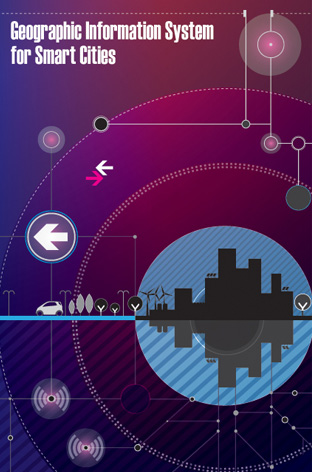a book Edited by Prof. T. M. VINOD KUMAR
Info: Copal Publishing
ISBN: 9788 1924 73352
Publication Date: May 2013
Dimension: 6 x 9 in.
Binding: Hardbound
Pages: 450

Smart cities are knowledge based cities, that develop extra ordinary capabilities to be selfaware, function 24 hours and 7 days a week, and communicate, selectively, in real time knowledge to citizen end users for satisfactory way of life with easy public delivery of services, comfortable mobility, conserve energy, environment and other natural resources, and create energetic face to face communities, and a vibrant urban economy even at a time there is National economic downturns. Twenty six international scholars explore the possibility of developing Smart Cities from experiences of many countries.
This book gives prime responsibility of City being self-aware to Geographic Information System, and its future development. Mukund Rao explores this transition from existing GIS to Smart City GIS; Mahavir, and Prabh Bedi, look at GIS and Smart urbanization, M. Priya, and Shirish Gadam, explore GIS for Sustainable Urbanization, Andrea Vega, Priya and Ravi Kumar, explore practical difficulties of implementing and maintaining of such self-aware GIS. Miguel A. Calero explores Open large scale geo-data management and web Map Services to achieve the Smart city goals, and Ashmita Karmaker looks GIS in community development.
Cities are mostly located in sea coasts and are vulnerable. While Bernd Gundermann explores Adaptive Urbanism for sea level rise, Anil Kumar postulates environmentally sensitive land use allocation for coastal smart cities. While Vijay Neekhra explains use of GS for management of Slums in Smart Cities, V. Sursh discusses the role of Smart buildings in Smart cities.
Highest level of mobility assumes importance in Smart Cities. While Bimal P. looks at the role of using Intra-day trip generation and travel management for a Smart city, M. A. Naseer explores Intelligent Goods transportation system. Shivani Aserkar Naik postulates a GIS based land use suitability and transportation model.
Conventional Land Use planning needs to be strengthened with GIS based modeling, and alternative approaches are required to be developed for Smart city planning. Gonzal A. Aranda Corral and Joaquin Borrego explore agent based simulation, focussed on natural disasters and safe l
ocation. Walter Barberis conceives a new discipline of Smart Planning.
Antonio Caperna and Stefano Serafini advocate biourbanism as a new framework for smart cities studies.
Richard Sliuzas, Mark Zuidgeest and Ngoc Quang Nguyen explore Smart cities future, opportunities and barriers through scenario based urban planning support system. M. Ramchandran looks at the past of Indian experiences, and how this experiences can be extended in future for Smart Indian cities. T. M. Vinod Kumar surveys limited Smart city experiences of India and identifies existing cities for Smart city upgrade, ways, and means of activation of Smart Communities, Smart institutional framework, Smart economy and deployment of Smart urban Technologies.